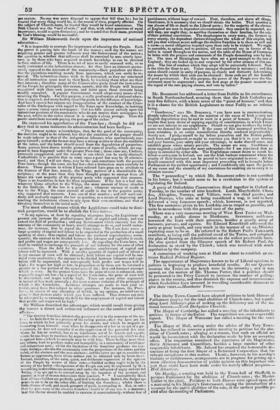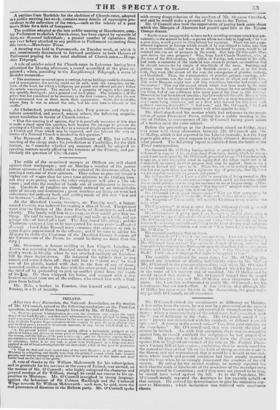The Derby Town-Council have adopted petitions to both Houses of
Parliament praying for the total abolition of Church-rates, but repudi- ating Lord Althorp's plan of making up the deficiency out of the na- tional income. —North Derbyshire Chronicle.
The Mayor of Cambridge has called a meeting of the inhabitants to petition in favour of theBallot. The requisition war most respectably signed. The Mayor of Worcester has called a meeting for the same purpose.
The Mayor of Hull, acting under the advice of the Tory Town- clerk, has refused to convene a public meeting to petition for the abo- lition of Church-rates ; alleging as a reason, that such an official act would be inconsistent with the declaration made by him on accepting office. The requisition contained the signatures of six Magistrates, thirty Aldermen and Councillors, besides u large number of other respectable inhabitants. Mr. Jalland has acquired the honourable dis- tinction of being the first Mayor of a Reformed Corporation that has refused compliance in this matter. Thanks, however, to his worship's timidity or faithlessness, arrangements are in progress for getting up a more effective demonstration of public opinion on this important sub- ject than could have been made tinder his merely official auspices.— Bull Advertiser.
On Monday, a meeting was held in the Town-hall of Sheffield, to petition Parliament for the abolition of Church-rates ; the Master- Cutler in the chair. Petitions to both Houses were agreed upon, also u memorial to his MajeSty's GOverinnent, urging the introduction of a measure for she etatire :abolition of the rate, at the earliest possible pe- riod after the meeting of Parliament, A petition from Rochdale for the abolition of Church-rates, adopted at a public meeting last week, contains many details of oppressive pro- ceedings in the collection of the rates,—such as the seizure of a poor man's Bible fora debt of fourpence.
The petition adopted at the late public meeting at Manchester, pray- ing Parliament to abolish Church-rates, has been signed by upwards of thirty-six thousand individuals ; a greater number of signatures than was ever before attached to any petition to Parliament emanating from this town.—.1fanchaster Times.
A meeting was held in Portsmouth, on Tuesday week, at which it was unanimously determined to forward petitions to both Houses of Parliament praying for the total abolition of Church-rates.—llamp- shire Telegraph.
A sale of articles seized for Church-rates in Leicester having been advertised for Monday afternoon, a crowd assembled at the place ap- pointed ; when, according to the Loughborough Telegraph, a scene of disorder occurred-
" The auctioneer mounted upon a carriage, but no biddings could he obtained ; and in consequence, the articles could not be sold, with the exception, we be- lieve, of the wool, for which a halfpenny per pound was offered privately before the article was exposed. The second lot, a quantity of sugar, when plat up, was speedily destroyed; and a general row took place. The attendarwe of the police was not considered to he necessary in the first instance, but after the row had commenced two or three made their appearance. Scott, the constable, whose duty it was to attend the sale, had his coat torn to ribands in the scuffle."
At Chelmsford, yesterday week, a few Tory mireons and their re- tainers assembled, and passed, among others, the following magnilo- quent resolution in favour of Church-rates-
" That this meeting is of opinion, that it is peculiarly necessary at this time to make a stand upon this question, both because the attempt to prevent the
i
granting of a Church. rate is the first in a series of attacks upon the constitution in Church and State which may be expected, and also because the very ex- istence of a National Church is involved in this question."
The Reverend J. 11. Browne, Archdeacon of Ely, has called a meeting of the clergy under his jurisdiction at Cambridge, fur the :-)4th instant, to " consider whether any measure should be adopted re- specting matters nearly affecting the interests of the Church, and par- ticularly the question of Chercb-rates."



























 Previous page
Previous page